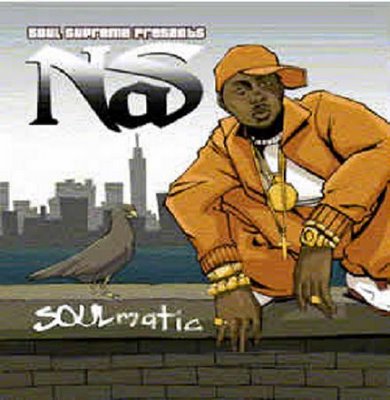Hip-hoppers who still sift through vinyl have learned to keep an eye out for instrumental versions of the latest albums. Some of which seem to be of somewhat dubious origin, but who really cares if it enables you to enjoy your favorite producer’s work without any rapper interrupting, if it allows you to mix that blend you knew would work, if you can finally spit over that banging beat yourself? Considerably rarer than instrumentals are acappellas, though. Who needs an album full of acapellas, anyway? I’ll tell you who: aspiring producers.
Earlier this year, his group Little Brother had just introduced itself with “The Listening”, producer 9th Wonder leaked his homemade remixes of “God’s Son” material, which eventually, packaged as “God’s Stepson”, ended up as an exclusive on www.HipHopSite.com. People were intrigued by the idea of one individual remixing an entire existing album, and soon enough other producers tried their hands at other Nas releases. Underground veteran MF Doom turned “Nastradamus” into “Nastradoomus”, while new jack Soul Supreme took care of “Stillmatic”, keeping up with the wordplay by naming his effort “Soulmatic”. Please notice that none of these releases are officially sanctioned by Sony and that we only review “Soulmatic” because it was sent to us.
Authorized or not, these remixing efforts ultimately spring from people’s uneasiness with Nasir Jones’ post-“Illmatic” output. Undoubtedly one of rap music’s most important voices, the man not only went through an identity crisis or two, he also made some highly questionable beat choices in his career. At the height of the Jay-Z vs. Nas feud when the two released their highly anticipated albums, I was quick to dismiss “Stillmatic” simply because “The Blueprint” had the better beats. Even so, it takes some nerve to put out a bootleg whose inherent message is ‘I would have done it better.’
But being relatively new to the game and probably still filled with excitement about the release of his debut album “The Saturday Nite Agenda”, Soul Supreme boldly offers alternatives to Large Professor and DJ Premier beats. Wisely enough, he decided not to deal with every single song, sticking to the first ten in the tracklisting. Thus “Soulmatic” is more of a hint at what could have been than an open challenge. Still, covering some of Nas’ most creative writing, it is substantial enough for us to seriously consider if “Stillmatic” would have been the better album with Soul Supreme’s beats.
The intro, “Stillmatic”, is not that different from the Hangmen 3 version, in that it also emenates that soulful glow and utilizes sped-up vocals, but everything is much clearer and more powerful, from the vocals to the heavy snares replacing the hectic rims. One particularly underachieving production on the original was the one for “Ether”. Soul Supreme offers two new takes, and both are clearly an improvement over the Ron Browz beat. The first one hails Nas with cold fanfares echoing relentlessly. Eerily enough, the dissection of Jigga seems much more on point in this harsher environment. The second one, entitled “Ether Remix Remix”, is more varied, with a wide range of horns and short sequences of deeply resonating strings. In both cases the Swedish producer upstages the original track, but even revamped Soul Supreme style “Ether” can’t touch “The Takeover”.
Having established himself with the sampling of mainly soul music, sometimes Soul Supreme seems more busy practicing his soulful ornaments than improving the Nas songs. Especially when he pitches some anonymous soul singer’s vocals up to incomprehensible chipmunk level, he quickly becomes trapped in the current production fad, no matter how creatively he chops things up. Maybe Megahertz’ “Got Ur Self A…” wasn’t that original, but there everything was in place, unlike in Soul Supreme’s crowded version. The same goes for Large Pro’s “You’re Da Man” and “Rewind”. Much more interesting is “Smokin”, where he replaces Nas and Precision’s standardized blunted atmosphere with a track that combines a strong, independent drumbeat (inspired by Nas’ delaying delivery in the chorus) with scraps of melodic fabrics.
Upon first hearing “Stillmatic”‘s “One Mic”, I thought the track was missing something. Since then it has become such a key song in Nas’ recent career stage that it’s hard to imagine it against a different background, even if there already was a Ty Fyffe remix. Soul Supreme recognizes the importance of keeping the track in tune with the rollercoaster vocals. The necessary crescendo is achieved with additional drums and sounds, but they never overshadow the lyrics, nor the centerpiece of his beat, a gypsy-like violin that plays independently throughout the track. Another winner is the lush “2nd Childhood” using a familiar sample and keeping DJ Premier’s cuts. The track is more intricate than Primo’s and seems to correspond better with the content on a pure emotional level. Likewise, “Destroy & Rebuild” with its thick-layered dark funk has more musical substance than the original Baby Paul/Mike Risko collabo. “The Flyest”, finally, seeps with soul-drenched strings, successfully challenging the original as well.
Most likely, people’s biggest gripe with “Soulmatic” will be the edited vocals. But even if the heavy editing on “From Illmatic to Stillmatic – The Remixes” spoiled it for you, this time you should be able to turn a deaf ear to this particular flaw. Consider “Soulmatic” an experiment where the lyrics are a constant and the beats are the variable. In the end it will still be all about Nas, the only question is which producers should play parents to this holy matrimony of beats & rhymes. And in that regard the dowry presented by Soul Supreme makes his beats a bride well worth considering. “Soulmatic” may be a hit-and-miss affair, but if this guy is to contribute to a future Nas album, it’s mostly a matter of seperating the hits from the misses. Let’s hope somebody makes the right decisions.

